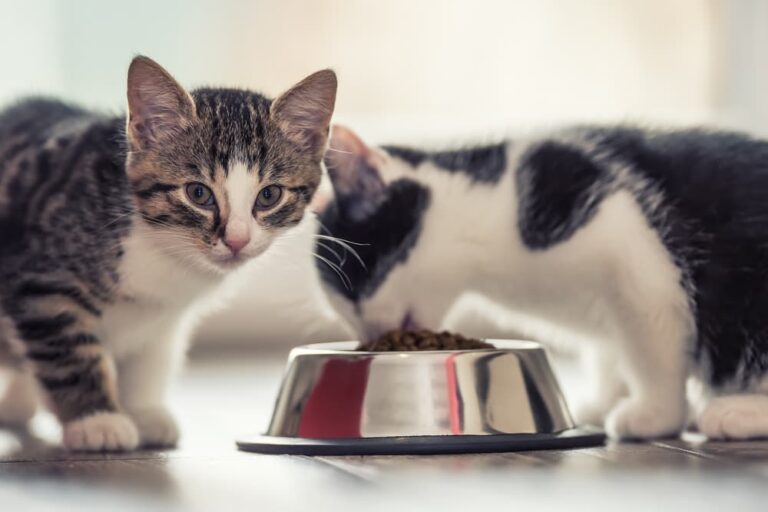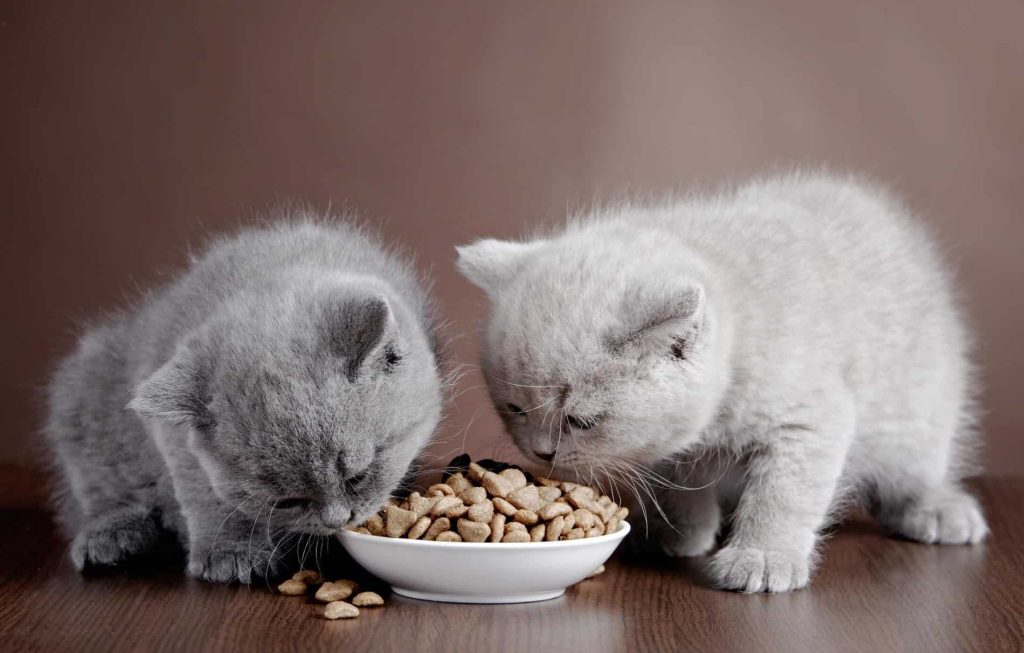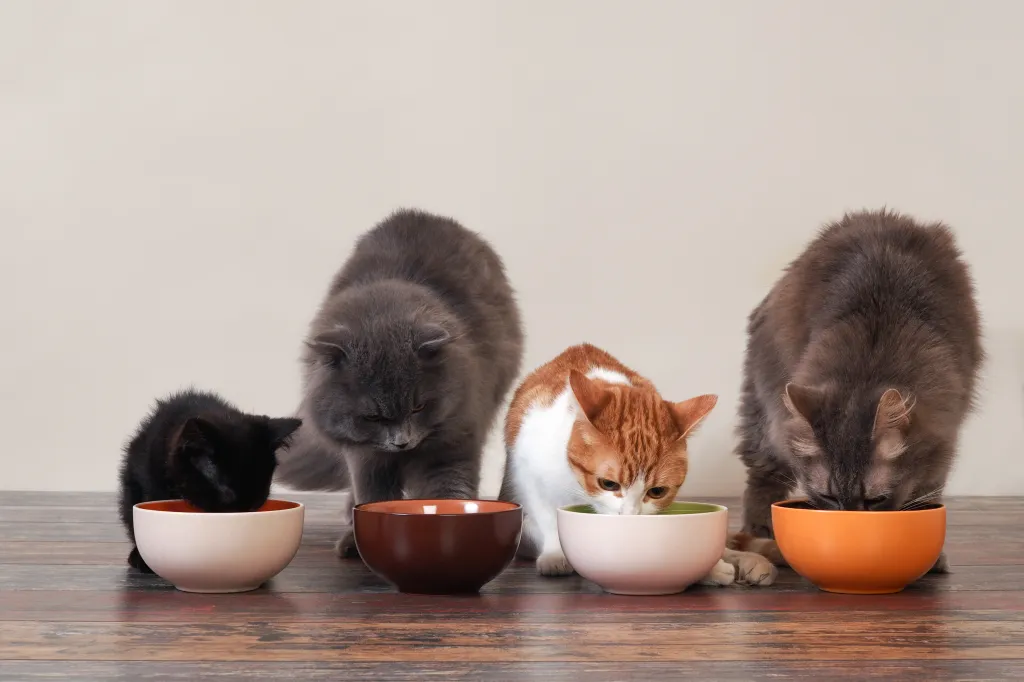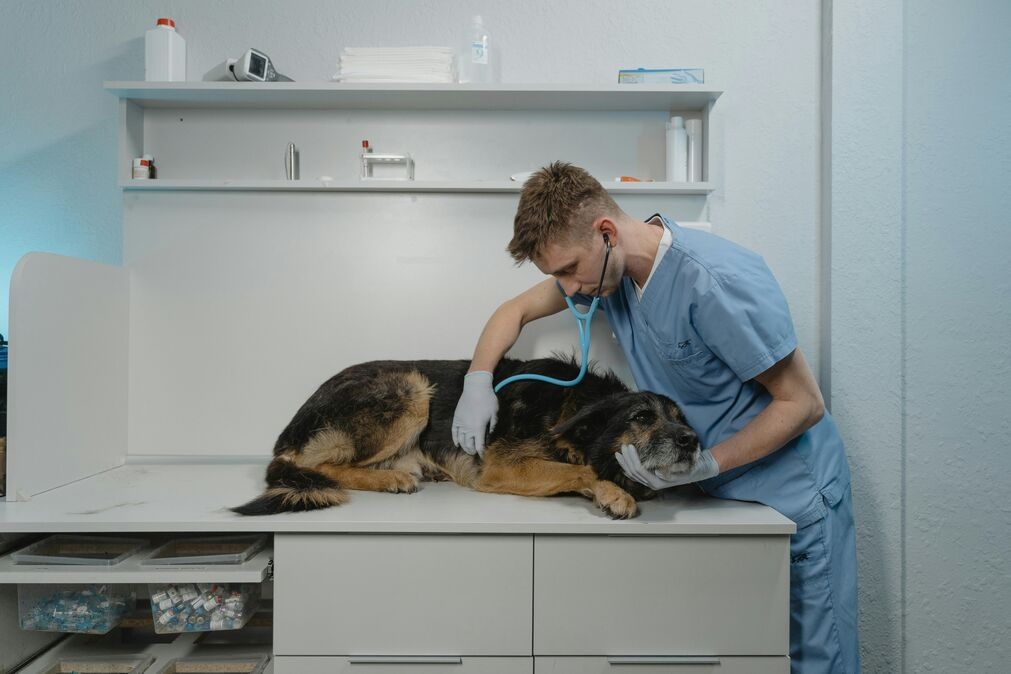No, A 5-month-old kitten should not eat regular adult cat food. Instead, they should continue to be fed kitten-specific cat food, which is formulated to meet their specific nutritional needs during their growth and development stage.
Moreover, Kitten food contains higher levels of essential nutrients such as protein and certain vitamins and minerals to support their overall health, muscle development, and growth. It’s important to continue with kitten food until they reach around 1 year of age, at which point a transition to adult cat food can be considered.
Always follow the recommendations on the cat food packaging or consult with your veterinarian for guidance on the appropriate type and amount of food for your kitten’s age and specific requirements.
Below you will see more details about it.
Types of Cat Food

There are several types of cat food available, each with its own characteristics and benefits. Here are some common types of cat food:
- Dry Cat Food (Kibble): Dry cat food is a convenient and economical option. It has a long shelf life and can help maintain dental health by reducing tartar buildup. However, it generally contains lower moisture content compared to wet food.
- Wet Cat Food: Wet cat food, often sold in cans or pouches, has a higher moisture content. This can be beneficial for cats that don’t drink enough water. It’s available in various flavors and textures, making it palatable for picky eaters.
- Semi-Moist Cat Food: Semi-Moist cat food is typically available in small packets or pouches. It’s a compromise between dry and wet food in terms of moisture content and texture.
- Raw Cat Food: Raw cat food consists of uncooked meat, bones, and sometimes vegetables. Some pet owners choose to feed their cats a raw diet, believing it mimics a more natural feline diet. However, it requires careful handling to prevent foodborne illnesses.
- Homemade Cat Food: Some prepare homemade cat food to have more control over the ingredients. Homemade diets should be carefully balanced and meet feline nutritional requirements to ensure the cat’s health.
- Prescription Cat Food: Also, Some cats have specific dietary needs due to health issues. Veterinary-prescribed cat food may be necessary for conditions such as urinary tract problems, allergies, or obesity.
- Grain-Free Cat Food: Grain-free cat food excludes common grains like wheat, corn, and soy. It’s marketed as being more suitable for cats with food allergies or sensitivities, but it’s essential to consult with a veterinarian before switching to such diets.
- Limited Ingredient Cat Food: These diets contain a minimal number of ingredients, making it easier to identify and manage food allergies or sensitivities in cats.
- Specialty Cat Food: Specialty cat foods are designed for specific life stages (kitten, adult, senior), lifestyles (indoor, outdoor), or breed-specific needs.
- Organic and Natural Cat Food: Organic and natural cat food options aim to use high-quality, often organic ingredients without artificial additives or preservatives.
What Can a 5-Month-Old Kitten Eat
A 5-month-old kitten is still in its developmental stage and has specific dietary needs to support growth and overall health. Here’s what a 5-month-old kitten can eat:
- Kitten-Specific Commercial Cat Food:
- Wet Kitten Food: Canned or pouched kitten food with a high moisture content. It is highly palatable and provides necessary hydration.
- Dry Kitten Food (Kibble): Dry kitten food formulated to meet the specific nutritional needs of growing kittens. Look for options designed for kittens to ensure they receive the right balance of nutrients.
- Homemade Kitten Food: If you prefer to make your own kitten food, it should be nutritionally balanced. Homemade recipes should typically include high-quality protein sources, such as chicken or turkey, and may also contain cooked vegetables, but it’s essential to consult with a veterinarian or a veterinary nutritionist to ensure the recipe meets dietary requirements.
- Feeding Frequency: Kittens of this age have high energy requirements and should be fed multiple small meals throughout the day. Generally, you can feed a 5-month-old kitten 3-4 times a day.
- Portion Control: Follow the feeding guidelines provided on the cat food packaging or as recommended by your veterinarian to ensure you are not overfeeding or underfeeding it.
- Protein-Rich Diet: They need a diet rich in high-quality animal proteins to support their growth and muscle development.
- Balanced Nutrients: Ensure the food you provide contains the necessary balance of macronutrients (protein, fat, carbohydrates) and micronutrients (vitamins and minerals).
- Water: Always provide access to fresh, clean water. Kittens, like adult cats, need water for proper hydration.
- Avoid Feeding Adult Cat Food: At 5 months of age, it is not ready for adult cat food. Continue to feed them kitten-specific food until they reach around 1 year of age when they can transition to an adult cat food diet.
- Consult with a Veterinarian: It’s crucial to consult with a veterinarian for guidance on it specific dietary needs, especially if your kitten has any health concerns or special dietary requirements.
Nutritional Needs
| Nutritional Needs | What They Do | What to Look For |
| Protein | Helps growth and muscles. | Kitten food with chicken, turkey, fish. |
| Fats | Gives energy and healthy skin. | Right amount of fats in the food. |
| Carbohydrates | Adds some energy and fiber. | Mainly focus on protein and fat. |
| Vitamins and Minerals | Essential for growth and health. | Balanced kitten food with vitamins. |
| Water | Keeps your kitten hydrated. | Wet food with high moisture or water. |
| Taurine | Important for heart and eyes. | Ensure kitten food has enough taurine. |
| DHA (Docosahexaenoic Acid) | Good for brain and vision development. | Many kitten foods have added DHA. |
| Amino Acids | Needed to build and repair tissues. | High-quality protein sources. |
| Caloric Needs | Higher energy due to growth and activity. | Feed to meet needs without overfeeding. |
| Fiber | A bit for digestion. | Balanced fiber level in the food. |
| Avoid Allergens | Be cautious of potential allergens. | Check for dairy, grains, and triggers. |
| Consult with a Veterinarian | Special needs or restrictions. | Vet can guide specific needs. |
Feeding Schedule
| Feeding Aspect | What to Do |
| Frequency | 3-4 times a day: Morning, Mid-Morning, Afternoon, Evening. |
| Portion Control | Measure and follow packaging guidelines or vet’s advice. Avoid overfeeding. |
| Consistency | Stick to a daily routine for your kitten’s meals. Cats like a schedule. |
| Access to Fresh Water | Ensure clean water is always available for hydration. |
| Treats | Limit treats, incorporate into daily meals to maintain nutrition. |
| Monitor | Keep an eye on weight, behavior, and appetite changes. Consult the vet if needed. |
| Transition to Adult Schedule | As they grow, shift to 2-3 meals like adult cats at regular times. |
Monitoring and Adjusting
Monitoring and adjusting your 5-month-old kitten’s health and diet is essential for their well-being. Keep an eye on their weight, body condition, behavior, and energy levels to ensure they’re growing at a healthy pace. Regularly check their stool, and be cautious of vomiting, appetite changes, and water intake.
In addition, dental health and possible allergies should also be monitored. Remember to schedule regular vet check-ups for vaccinations and guidance. If you notice any concerns, consult with your vet before making dietary changes, and as your kitten nears one year of age, discuss the transition to adult cat food with your veterinarian to meet their changing nutritional needs.
How can you stop your kitten from stealing food from your older cat?
To stop your kitten from eating too much of the adult cat’s food, you can:
- Feed them at different times.
- Put their food in different rooms.
- Keep an eye on them while they eat.
The Importance of Quality Cat Food
Choosing good cat food has many advantages for your kitten:
- It helps them grow strong and healthy.
- They won’t have nutritional problems.
- It keeps them in good shape and boosts their immune system.
Plus, it can prevent issues like:
- Urinary problems.
- Obesity.
- Pancreas troubles.
- Heart disease.
Common Mistakes to Avoid

Feeding and caring for a 5-month-old kitten comes with certain responsibilities, and avoiding common mistakes is essential to ensure their health and well-being. Here are some common mistakes to avoid when raising a kitten:
- Overfeeding: One of the most common mistakes is overfeeding. Follow the recommended portion sizes for your kitten’s age and weight. Overfeeding can lead to obesity and related health issues.
- Inadequate Water Intake: Kittens, like cats, need access to fresh water at all times. Ensure their water bowl is clean and filled regularly. Dehydration can cause health problems.
- Feeding Adult Cat Food: Do not feed it adult cat food. They have different nutritional requirements, and their food should be specifically formulated for their age and growth stage.
- Inconsistent Feeding Schedule: Kittens thrive on routine. Establish a consistent feeding schedule and stick to it. Inconsistent feeding schedules cause anxiety or behavior issues.
- Ignoring Signs of Dietary Issues: Pay attention to any signs of food allergies, sensitivities, or digestive problems. Common signs may include vomiting, diarrhea, or changes in coat condition. Address these issues with your veterinarian.
- Free Feeding: Avoid leaving food out all day for your kitten to graze on. It makes portion control difficult, and some kittens may overeat. Stick to scheduled meals.
- Excessive Treats: Limit the use of treats and ensure they are given in moderation. Excessive treats can disrupt the balance of the diet.
- Inadequate Dental Care: Dental health is important for cats. Consider brushing your kitten’s teeth or providing dental treats and toys.
- Skipping Vet Check-Ups: Regular veterinary check-ups are crucial for monitoring your kitten’s health, vaccinations, and addressing any concerns. Do not skip these appointments.
- Introducing Dietary Changes Abruptly: If you need to change your kitten’s diet, do it gradually over a week or two to avoid digestive upset.
- Lack of Play and Mental Stimulation: They need mental and physical stimulation to stay happy and healthy. Provide toys, playtime, and social interaction to prevent boredom and behavioral problems.
- Neglecting Socialization: Proper socialization during kittenhood is essential for a well-adjusted adult cat. Expose it to various people, animals, and environments to prevent fear or aggression issues.
- Not Preparing for Scratching Behavior: Further, they have a natural instinct to scratch. Provide scratching posts and toys to redirect this behavior and protect your furniture.
- Ignoring Litter Box Issues: If it has litter box issues, don’t ignore them. It could be a sign of a medical problem or behavioral issue. Address the problem promptly.
- Not Neutering/Spaying: Neglecting to spay or neuter your cat may result in unintended pregnancies as well as specific health and problems with conduct. See your veterinarian about the best time to do this.
FAQ’s
Can you feed a 5-month-old kitten cat food?
No, Kittens should be fed specially tailored kitten food until they reach 12 months of age, as it supports their rapid growth and development. At 1 year old, they can transition to adult cat food.
What happens if my kitten eats cat food?
Adult cat food is not dangerous for kittens, but they shouldn’t overeat. Teaching them to respect feeding schedules is essential, especially if you have multiple cats.
What can I feed my 5-month-old kitten?
Feed your 5-month-old kitten kitten food, both wet and dry, until they are at least 8 months old. Always ensure they have access to fresh water.
Is normal cat food OK for kittens?
No, Most experts recommend specially formulated kitten food until age 1. While some cat foods are labeled for all life stages, they might not be suitable for kittens without proper testing.
What is the healthiest kitten food?
Some recommended kitten foods include Purina Pro Plan Kitten Salmon and Ocean Fish Entree, Hill’s Science Diet Kitten Chicken Recipe, and Royal Canin Kitten Thin Slices in Gravy.
What can I feed my 5-month-old kitten without mom?
Wet kitten food and moistened kitten chow can be offered, but they need to be changed frequently to prevent spoiling, and ensure your kitten doesn’t eliminate in it.
Is a 5-month-old kitten still a kitten?
Yes, a 5-month-old kitten is still considered a kitten. They continue to need specialized nutrition and support for their development until around 12 months of age.
Do 5-month-old kittens need milk?
No, Kittens can have replacement milk formulas, but they shouldn’t need milk once they are fully weaned. Cow’s milk does not provide the necessary nutrients for kittens.
Final Words
Finally, it should be noted that a 5-month-old kitten should not be fed adult cat food. It is important to provide kittens with food designed specifically for them in order to fulfil their unique nutritional needs during this crucial phase of growth and development.
Moreover, Kitten food offers the right amount of nutrients in the right proportions to help both overall health and muscular growth, including greater protein and certain vitamin and mineral content. Up until they are around a year old, it is imperative to feed them kitten food; after that, a gradual switch to adult cat food may be contemplated.
Also, always get advice from your veterinarian to make sure your kitten is fed the right kind and quantity of food for their age and specific requirements. The health and well-being of your feline friend are greatly influenced by proper diet.











